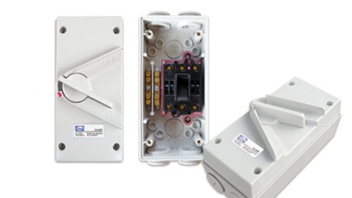In numerous industrial and special - environment application scenarios, the waterproof performance of the Waterproof Isolator is of utmost importance, as it directly impacts the normal operation and service life of equipment.

Detailed Explanation of Waterproof Ratings
The waterproof performance of waterproof isolators is measured by the International Protection Rating (IP Code), among which IP67 and IP68 are common and relatively high waterproof ratings.
The IP67 rating means that the equipment can be immersed in water at a depth of 1 meter for 30 minutes and still operate normally. This rating requires extremely high sealing performance of the waterproof isolator to ensure that water does not enter the equipment, avoiding damage such as short - circuits to the internal circuits. For example, in the connection of electrical equipment temporarily in a humid environment, a waterproof isolator with an IP67 rating can reliably protect the circuit.
The IP68 rating is even more stringent. It requires that the equipment can be immersed in water at a depth exceeding 1 meter for an extended period. The specific immersion depth and time requirements vary for different products, but they all far exceed the standards of IP67. Waterproof isolators used in deep - sea exploration equipment, underwater surveillance cameras, etc., often need to reach the IP68 rating to withstand the huge water pressure and long - term water immersion test.
Q: How can we intuitively determine whether a waterproof isolator reaches the IP67 or IP68 rating?
A: The IP code is generally marked on the product shell. If it is marked as IP67 or IP68, it means that the product has reached the corresponding rating. At the same time, you can also check the product manual, which will detail the waterproof rating standards and relevant test data that the product has achieved through testing.
Principles of Waterproof Technology
Application of Special Sealing Materials:Many waterproof isolators use special sealing materials such as silicone rubber and nitrile rubber. These materials have good flexibility and water resistance, and can closely fit the interfaces and gaps of the equipment to effectively prevent water from entering. For example, at the connection between the cover and the main body of the waterproof isolator, a silicone rubber gasket can be used to form a reliable waterproof barrier.
The Key Role of Waterproof Rubber Rings:Waterproof rubber rings are important waterproof components of waterproof isolators. They are usually installed at parts of the equipment that are prone to water ingress, such as ports and covers. When the equipment is assembled, the waterproof rubber rings are compressed to fill the gaps and prevent water from penetrating. Taking the common circular port of a waterproof isolator as an example, the waterproof rubber ring surrounds the port to ensure good waterproof performance in various environments.
Q: What are the consequences if the waterproof rubber ring of a waterproof isolator is damaged?
A: After the waterproof rubber ring is damaged, the waterproof performance of the waterproof isolator will be greatly reduced. Water may enter the equipment through the damaged rubber ring, causing problems such as short - circuits and corrosion of the internal circuits, which can then prevent the equipment from operating normally. In severe cases, it may even damage the equipment.
The Relationship between Waterproof Performance and Application Scenarios
In underwater operating equipment, such as underwater robots and underwater exploration instruments, the waterproof isolator must have extremely high waterproof performance, usually reaching the IP68 rating. Because these devices will be in a high - pressure water environment for a long time, and a slight water ingress can cause damage to the expensive equipment. In general outdoor humid environments, such as construction sites and temporary outdoor lighting systems, a waterproof isolator with an IP67 rating can basically meet the waterproof requirements and prevent circuit failures caused by rain, dew, etc.
Q: When choosing a waterproof isolator, is it sufficient to only consider the waterproof rating?
A: The waterproof rating is an important factor, but not the only one. You also need to consider the working voltage, current, installation space of the equipment, and its compatibility with other devices. For example, if the equipment has a large working current, you need to select a waterproof isolator that can withstand the corresponding current. Otherwise, it may cause safety issues such as overheating and even fire due to overload.
By deeply understanding the waterproof performance of waterproof isolator, including waterproof ratings, technical principles, and their adaptability to application scenarios, we can more rationally select and use waterproof isolators to ensure that they provide reliable waterproof protection for electrical equipment in various environments.
GET A QUOTE